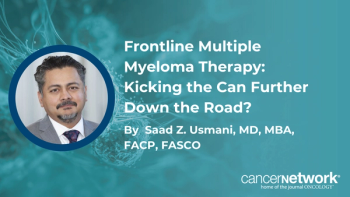
Long-Lasting Benefit Observed With Atezolizumab and Bevacizumab in Recurrent Endometrial Cancer
Results from a phase 2 trial indicated that atezolizumab and bevacizumab yielded a significant duration of response in recurrent endometrial cancer.
Atezolizumab (Tecentriq) and bevacizumab (Avastin) yielded durable responses in patients with recurrent endometrial cancer, according to findings from a multi-institutional phase 2 trial (NCT03526432) that were presented during the
In the overall population of 57 evaluable patients treated with the combination, the overall response rate (ORR) was 30% (95% CI, 18%-43%). The ORR in patients with mismatch repair proficient (MMRp) tumors was 33% (95% CI, 20%-48%). Additionally, the median duration of response (DOR) was 15 months (95% CI, 2.9-34), and the median progression-free survival (PFS) was 7.87 months (95% CI, 5.5-11.7). In addition to highlighting the promising DOR, lead author Katherine Fuh, MD, PhD, highlighted the combination’s particular benefit in patients by MMR status.
“We identified that patients with partial response or complete response [CR] had a significant DOR,” according to Fuh, an associate professor of Obstetrics and Gynecology at Washington University School of Medicine in St. Louis Missouri. “[In the] tumors [that were] MMRp, we had a significant number of patients with [CR].”
The study included patients with advanced/recurrent endometrial cancer with either endometrioid, serous, mixed adenocarcinoma, clear cell, or carcinosarcoma histology. Patients were also required to have received 1 or 2 previous lines of chemotherapy and measurable disease at the time of recurrence. Treatment with prior carboplatin and paclitaxel was allowed. Archival tissue or tissue biopsy were also required.
Following initial pre-treatment blood collection, patients received 15 mg/kg of intravenous bevacizumab and 1200 mg of atezolizumab on day 1 of every 21-day cycle. The study’s primary end point was ORR, with secondary end points including progression-free survival, overall survival, safety, and ORR by immune-related response criteria. Moreover, exploratory end points consisted of immune subpopulations by cytometry by time of flight (CyTOF) and multiparametric fluorescent imaging by CODEX.
The median patient age was 57 years (range, 49-63). In terms of other significant clinical characteristics, 80% of tumors were MMRp. Moreover, approximately half of patients were diagnosed with stage 1 or 2 disease (50.9%) and stage 3 or 4 disease (49.1%), respectively. In terms of disease histology at diagnosis, 52.6% of patients had endometrioid carcinoma, 17.5% had carcinosarcoma, 15.8% had serous carcinoma, 10.5% had adenocarcinoma not otherwise specified, and 3.5% of patients had clear cell carcinoma.
The multiparametric, single-cell CyTOF analysis utilized antibodies conjugated to rare metal ions, thus allowing for the examination of multiple types of antibodies and signals at the same time. The purpose of the platform was assess which patients may progress or respond to treatment with bevacizumab and atezolizumab by examining blood taken before and after 2 cycles of treatment.
“We did identify [that] the non-classical monocytes and the ICOS-expressing T regulatory cells did increase in the [presence of] progressive disease [for that] that patient. Interestingly, the ICOS-expressing T regulatory cells have been found to be more immunosuppressive than the ICOS-negative T regulatory cells,” Fuh explained.
Grade 3 adverse effects (AEs) associated with atezolizumab occurred in 7% and 22% had AEs associated with bevacizumab. No grade 4 AEs occurred. Dose interruptions, reductions, and discontinuations due to AEs occurred in 79%, 4%, and 16% of patients, respectively. The most frequent any-grade AEs included fatigue (43.9%), diarrhea (34.8%), and hypertension (33.3%). Moreover, common grade 3 or higher AEs included hypertension (21.2%), fatigue (7.6%), and proteinuria (7.6%).
Reference
Fuh K, Richardson D, Arend R, et al. Atezolizumab and bevacizumab in recurrent endometrial cancer: a phase 2, multi-institutional trial. Presented at: 2022 International Gynecologic Cancer Society Annual Meeting; September 29-October 1, 2022; New York, NY. Abstract O012. Accessed October 3, 2022.
Newsletter
Stay up to date on recent advances in the multidisciplinary approach to cancer.






































